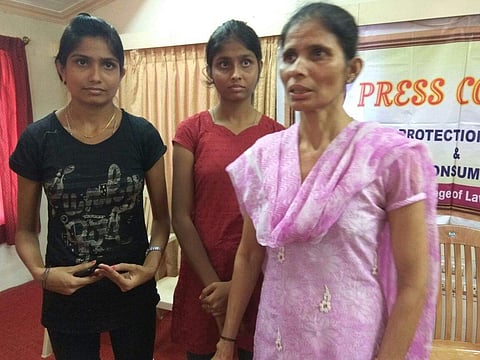

UDUPI: After 14 torturous months, Jacintha Mendonca, a home nurse from Karkala taluk in Udupi district, who was entrapped in a human trafficking racket run out of Mumbai and sent as a slave to Yanbu, Saudi Arabia, is finally back home with her family. The health of the 42-year-old woman, a mother of three, was declared stable after a medical check-up conducted at a private hospital in Udupi on Saturday morning.
Jacinta’s troubles started after her husband died last year and she became the sole bread winner of the family. In order to take care of her three children and to provide for their education, she was in search of employment. She happened to notice an advertisement in a local newspaper wherein an Indian family in Qatar needed a home nurse. She contacted a Mumbai-based recruitment agency headed by one Shabaz Khan, who assured her that she would be paid `25,000 per month. He also assured her that he would arrange the passport and visa through his representative in Mangaluru.
Following this, Jacinta travelled to Mumbai and was housed somewhere in Dongri for a few days. She was then taken to Dubai via Goa and Delhi on June 10, 2016 along with two other women. Thereafter, she lost track as to where she was being taken to. To her horror, only on landing at the airport did she discover that she had been taken to Yanbu, Saudi Arabia instead of Qatar.
It was only after the Human Rights Protection Foundation (HRPF) of Udupi contacted Roshan Rodrigues, the head of the NRI Forum in Saudi Arabia, and his team in April this year that Jacinta was finally rescued and reunited with her family.
Hellish experience
Jacinta was made to work day in and day out in the three mansions belonging to the employer’s mother, three wives and their children. She was made to do all the odd jobs apart from household chores and was only allowed to eat the leftover food. Her toil of over 16 hours a day and starvation took a severe toll on her health. The employer showed no mercy when she pleaded with him that she was ill and could not work.
“Under no circumstances will I send you back to India before your contract ends,” the employer threatened her. She was oblivious of any contract made and the terms and conditions of the contract.
Jacinta attempted to flee from the house and return to India on November 28, 2016. But her luck ran out when a neighbour, on the pretext of directing her to the Indian embassy, took her to the police station. The police, in turn, made enquiries and took her back to the same employer. That night, the men of the house beat her black and blue and slammed her head against a wall until she lost consciousness.
HRPF steps in
With the help of an Indian driver, Jacinta managed to contact her children back home. A priest directed Velita, Jacinta’s daughter, to approach Human Rights Protection Foundation, Udupi. They tracked the agent who sent her to Saudi Arabia, which led the family and the foundation to where Jacinta was.
Where did the money go?
Human Rights Protection Foundation then tracked the employer (Abdul Almuttairi). On contacting him, he said Jacinta was contracted to work for two years. He claimed to have paid the Indian agent 24,000 Saudi Riyals (about `5 lakh. He said he would send her back if this money was returned. Jacintha’s family had not received any money. The foundation then lodged a complaint.
‘More women can be rescued’
There have been several reports of women from the coastal region being victimised by human traffickers of Mumbai. Human Rights Protection Foundation president Ravindranath Shanbhag said after he started working on Jacinta’s case, he came to know that there are 40 more women from coastal Karnataka whose whereabouts are untraceable after they went abroad.